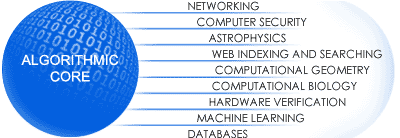
|
About
|
 |
|||||||||||||||||||||||||||||
|
The Center for ALgorithm ADaptation Dissemination and INtegration (ALADDIN) at Carnegie Mellon University was established in September 2001 for the study of algorithms and their applications. It is funded through the NSF ITR program and is a collaboration among several departments at Carnegie Mellon, industrial partners, and Princeton University. Towards this goal, the Center:

Carnegie Mellon has a strong and diverse group in Algorithms and Complexity Theory. The goals of the group are, broadly speaking, to provide a mathematical understanding of fundamental issues in Computer Science, and to use this understanding to produce better algorithms, protocols, and systems. Research interests include data structures, algorithm design, complexity theory, parallel algorithms and languages, machine learning theory, cryptography and security, on-line algorithms and scientific computing. Our Algorithms and Complexity group maintains strong ties to other areas, such as computer systems, programming languages, and artificial intelligence, and we welcome students who have a combination of theoretical and application-oriented research interests. |
|||||||||||||||||||||||||||||
|
|
This material is based upon work supported by National Science Foundation under Grant No. 0122581. Any opinions, findings, and conclusions or recommendations expressed in this material are those of the author(s) and do not necessarily reflect the views of the National Science Foundation |
